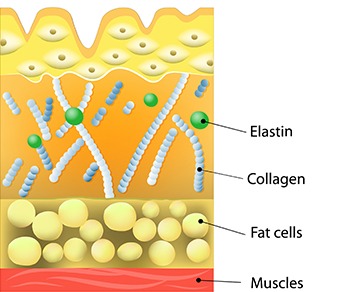Signs Of Ageing
As your skin ages and is exposed to UVA & UVB rays, the rate at which new skin cells develop slows down. As a result, the balance of new skin cells versus old is changed. Additionally, collagen and elastin begin to break down causing the skin to lose resilience.
Causes of Skin Ageing

Causes of Skin Ageing
Ageing is a natural process. However, premature ageing of the skin can cause concern for younger individuals. The reasons for this cannot be attributed to just one factor; with environmental, hormonal and biological factors all playing a role. With that said, certain factors are more likely to cause premature ageing than others. These include:
• Sun Exposure – The Ultraviolet rays of the sun are an invisible form of radiation that penetrates to deep layers of the skin. As they pass through, they cause damage to collagen, which in turn results in darkening and pigmentation.
• Stress – Individuals suffering from stress at work, or home may find themselves affected by premature ageing due to stress chemicals being released in the body triggering negative biological changes.
• Lack of Sleep – When in deep sleep, the pituitary gland in our brain secretes a growth hormone used to maintain body tissue health as well as promoting renewal; this includes the skin tissue. Prolonged lack of sleep means that an individual is not secreting the growth hormone, so the skin tissue is not healthily maintained or renewed. This leads to premature signs of ageing.
• Smoking – Individuals who smoke tend to experience premature signs of ageing such as fine lines and wrinkles up to 10 years before a non-smoker. Premature ageing occurs in smokers due to the reduction of vitamin C in the blood, which causes a reduction in collagen production.
• Alcohol – Drinking excessive amounts of alcohol can cause accumulation of toxins in deeper skin layers, leading to premature signs of ageing.
Seven Signs of Ageing

Seven Signs of Ageing
There are seven clear signs of ageing skin:
Hyperpigmentation – Dark spots, sunspots or discolouration of the skin are all forms of hyperpigmentation. This generally occurs when melanin, the pigment that gives our skin, hair and nails its natural colour, is overproduced. The most common trigger for hyperpigmentation is sun damage.
Sagging Skin – Loss of elasticity is a clear sign an individual’s skin is ageing. It’s caused by the reduction of collagen and elastin fibres – both of which are responsible for helping the skin to retain its shape. Many environmental factors including smoking and harsh environments can cause damage, breaking down the fibres and leaving your skin looking stretched and sagging.
Lines & Wrinkles – Fine lines and wrinkles are a natural part of the skins ageing process, but, in a young individual this is a sign of premature ageing and could be caused by a variety of factors including prolonged sun exposure and smoking.
Dry Skin – Although most dry skin conditions are caused by environmental factors, dry skin can eventually lead to wrinkles. When the skin is dry, it naturally produces a lower volume of essential oils that are crucial for skin health and rejuvenation.
Open Pores – As you age, environmental factors lead to a loss of elasticity in the skin. When this happens, the skin around each pore is not as collagen-rich or firm as it was previously, resulting in pores becoming clogged or enlarged.
Dull skin – Due to the skin cell turnover rate, it is common to notice the skin becoming duller over time. This is because the skin cell renewal rate is slowing, meaning ageing skin will become more noticeable.
Puffy Eyes – As the body ages, the eye tissue and some of the muscles supporting your eyelids begin to weaken. The fat that helps support the eyes can then move to the lower lids, causing them to appear puffy.
Treatment and Products for Ageing Skin

Treatment and Products for Ageing Skin
Although ageing is completely natural and unavoidable, there are some lifestyle changes and treatments that can be used to help prevent and slow premature signs of ageing:
- Stay protected from the sun – The sun is one of the biggest contributing factors when it comes to ageing skin so it’s important to take steps to protect yourself. It is recommended that you avoid exposure when the sun is at its strongest and that you wear sunscreen on a daily basis.
- Chemical Peels – Skin/Chemical Peels are common treatments for helping to smooth fine lines and wrinkles by unveiling new skin underneath. Chemical peels can also be used to help with scars, acne and sun damaged skin as well as improving the overall look and feel of the skin on the face, neck, eyes and around the mouth.
- Toxins – The use of botulinum toxins has become increasingly popular over recent years due to its ability to soften and relax wrinkles.
- Cleansers, toners and moisturisers – There are a range of skin products designed to help keep the skin looking young. Some can be purchased in local shops while others will need to be prescribed. Obagi is a popular brand that has a range of products which assist with signs of ageing skin. The Obagi Nu-Derm System penetrates the skin surface to transform cell function and improve wrinkles and fine lines.
How can we help?
Healthxchange is a trusted supplier of pharmacy products to healthcare professionals and offer a range of treatments that can be used to help manage ageing skin.
Obagi Nu-Derm Systems and Obagi-C Systems are formulated specifically for people with ageing skin and/or premature ageing by targeting the skin cells to help improve the overall look of the skin by reducing the appearance of wrinkles and fine lines.
To find a clinic near you offering Obagi Nu-Derm Systems or Obagi-C Systems, use our Clinic Finder.
